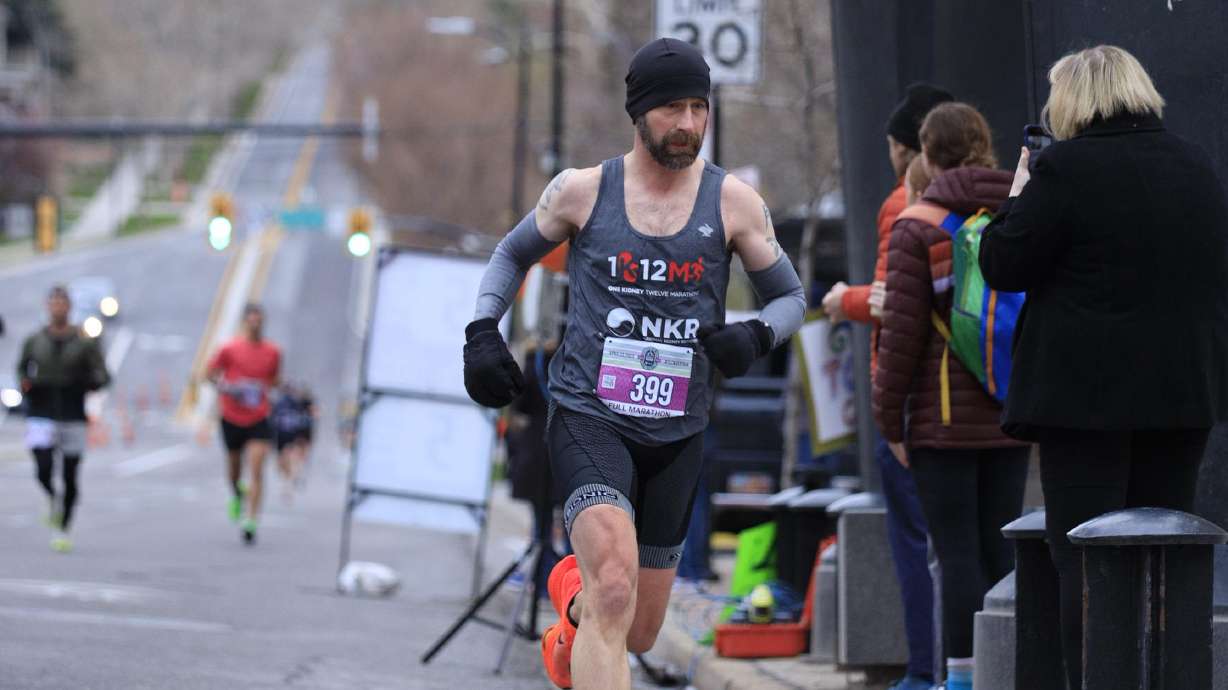Estimated read time: 3-4 minutes
This archived news story is available only for your personal, non-commercial use. Information in the story may be outdated or superseded by additional information. Reading or replaying the story in its archived form does not constitute a republication of the story.
PARK CITY — Even with only one kidney, 44-year-old Park City resident Matt Cavanaugh will be running his 12th marathon of the year on Sunday, completing his goal of completing 12 marathons, each in under three hours, in 2023.
This isn't his first time pushing his body so hard — seven months after donating his kidney in 2021, he ran an ultramarathon in the Namib desert in Africa, where temperatures reached up to 131 degrees Fahrenheit.
Why does he do it? "To demonstrate that there is no limit on life after kidney donation. You can donate a kidney, save a life and go right back to doing any physical activity you care to do — up to and including a dozen marathons," Cavanaugh said.
According to a National Kidney Registry poll, 75% of Americans believe that the body of a person who donates his or her kidney is physically degraded, and Cavanaugh wants to prove that's a misconception.
Cavanaugh first considered donating his kidney about 15 years ago, delaying it because of his service in the U.S. Army, marriage and the birth of two daughters.
Two years ago, he thought about donating again. "At a relatively low cost and risk to me, someone else gets life, and I could not get that idea out of my head," Cavanaugh said. As a lieutenant colonel in the Army at the time, Cavanaugh said it was his duty to protect American lives, and he felt that he could do more among a deadly pandemic, especially when he says he owed his life to protectors during his tour in Iraq.
Cavanaugh's kidney was shipped to Seattle and given to someone he still has never met.
While recovery is different for everybody, Cavanaugh said he was jogging 27 days after the surgery, and taking his daughters skiing two months after that. A colleague who is running the 12 marathons with him started running two weeks after her surgery, Cavanaugh said.
Due to modern technology, kidney removal only left him with a 2.5-inch scar.
After his quick recovery, Cavanaugh said he felt like he got a "second wind" and decided to sign up for the 4 Deserts Ultramarathon Series, running about 155 miles each in Antarctica, Georgia, Namibia and Chile. He won first place in Antarctica, hitting the record for fastest American to ever race the 4 Deserts.

While his purpose was to bring awareness to the capabilities of a living kidney donor, he asked himself, "If you're running out in deserts, how many people are you really reaching?" Thus, at the end of 2022, he devised a plan with the National Kidney Registry to run 12 of the biggest marathons in the country, and do every one in under three hours.
The challenge has been dubbed the 1K12M challenge (1 kidney, 12 marathons). Below are the dates and Cavanaugh's times at each marathon he's run so far:
- Feb. 26: Publix Atlanta Marathon (2:53:25)
- March 19: Los Angeles Marathon (2:51:03)
- April 22: Salt Lake City Marathon (2:50:06)
- May 7: Cincinnati Flying Pig Marathon (2:52:09)
- May 21: Denver Colfax Marathon (2:55:21)
- June 4: Rock 'n' Roll San Diego Marathon (2:53:20)
- Oct. 7: Twin Cities makeup marathon (original was canceled) (2:59:07)
- Oct. 14: Hartford Marathon (2:54:42)
- Oct. 29: Marine Corps Marathon (2:55:05)
- Nov. 5: New York City Marathon (2:55:38)
- Nov. 19: Philadelphia Marathon (2:53:28)
Not once has Cavanaugh had kidney or health issues from all his running, only receiving typical runners' injuries like a pulled muscle.
Cavanaugh looks forward to running the Honolulu marathon on Sunday to finish out the year.
To learn more about 1K12M, visit 1K12M.org.
To learn more about living kidney donation, visit The National Kidney Registry.









